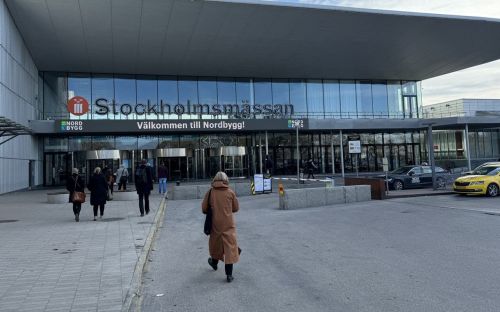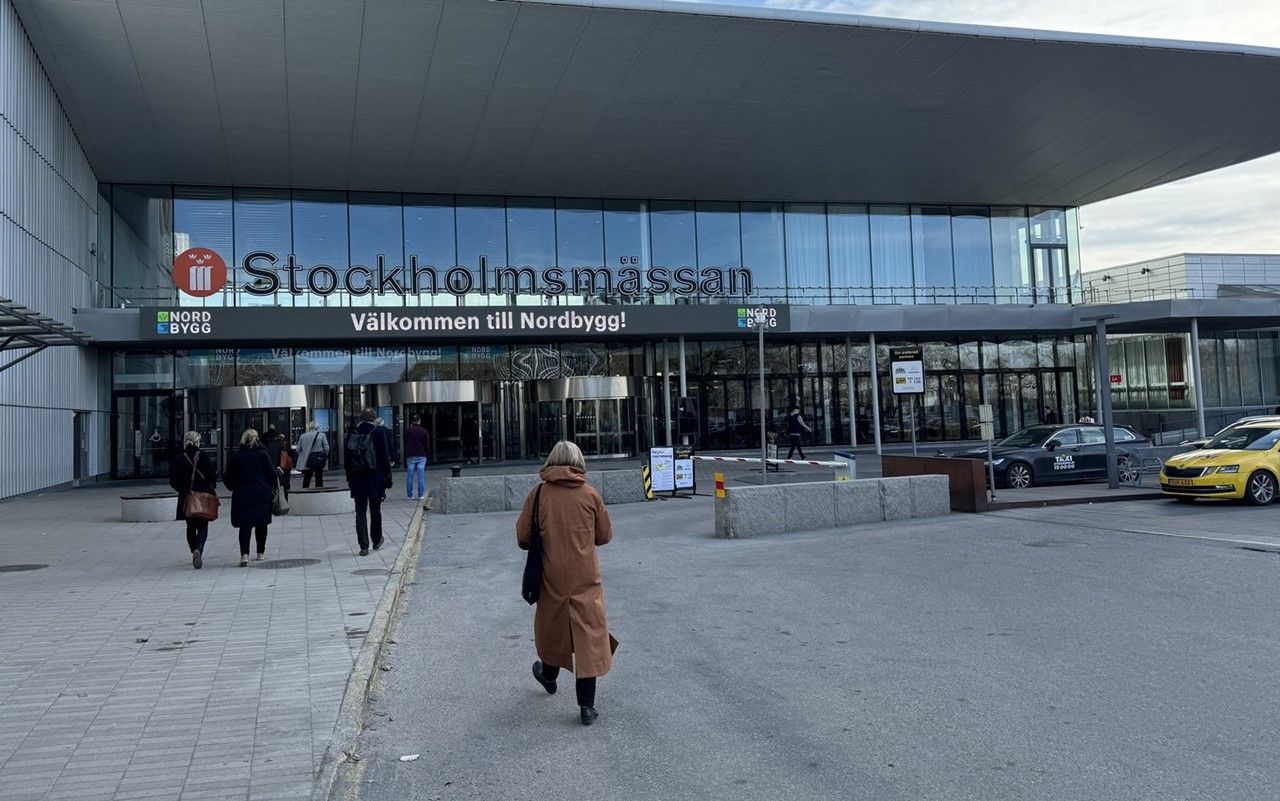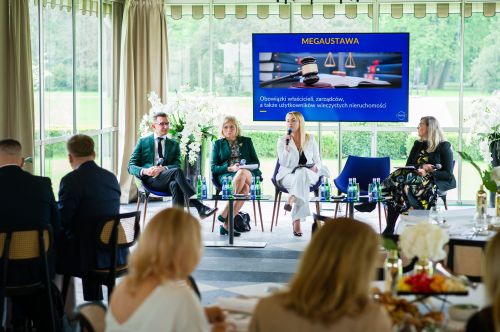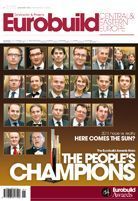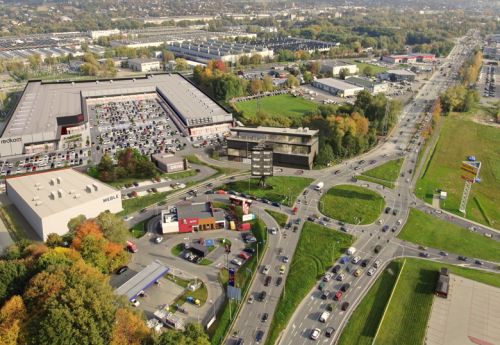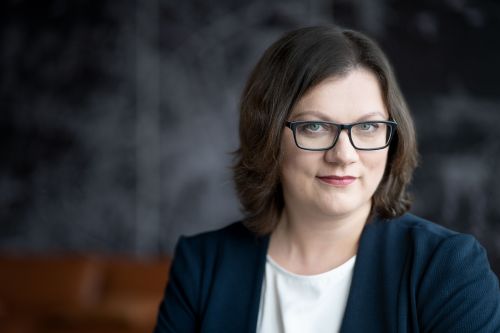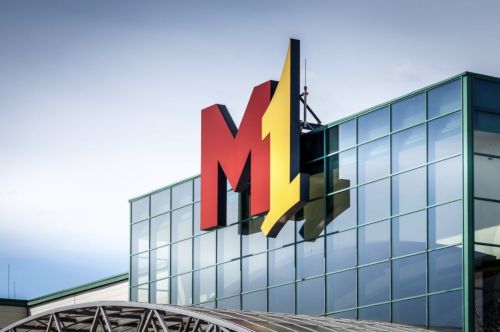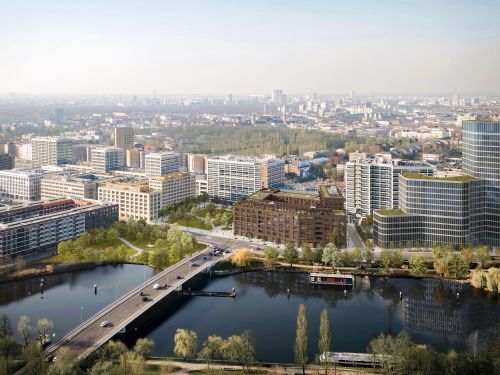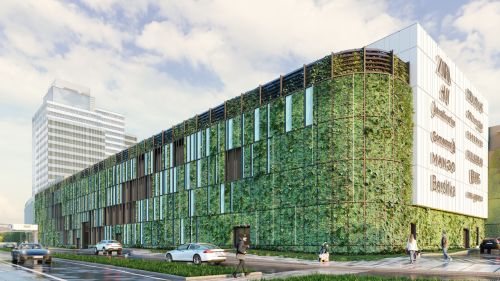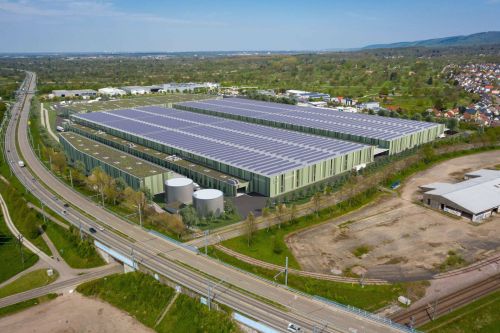You ain’t heard the last from me
What is the secret behind the success of the founder and president of Apollo Rida, the recipient of the Eurobuild Lifetime Achievement Award? Why did he decide to come back to a devastated Poland after forty successful years in the US? What has protected him from misfortune, and when is he planning to retire? David Mitzner, the president of the management board of Apollo Rida Poland, attempts to answer these questions
Emil Górecki, ‘Eurobuild CEE’: Are such awards as the Eurobuild Lifetime Achievement Award important to you?
David Mitzner, president of the management board of Apollo Rida Poland: Yes, they are, even though they don’t excite me as much any more. I don’t seem to have been doing anything but receive awards over the last ten years: in Houston, Washington, Warsaw... awards in different environments for a variety of achievements. The certificates and congratulations now hang on my wall, but the Eurobuild Award statuettes stand on my desk.
Recently we observed the anniversary of the imposition of martial law. Did you maintain an interest in events in Poland during your time in the US?
After I left Poland in 1949 and was released from a Soviet forced-labour camp in Siberia, I followed events closely in communist Poland. I was always against this system. My family was orientated towards business and to industrial and economic development, just like everybody around us. In the 1980s when the system was on the verge of collapse, we were getting more and more news about Poland in the US. At the time I wanted to come here very much. I always emphasise that I am, I was and I always will be a Polish patriot. I have Poland and its development at heart. I always believed that the regime would collapse one day, not necessarily in my lifetime, even though I wanted it to very much. Meanwhile, I opened a factory producing tights in the USA, and later I was involved in importing accessories for women. This is the sort of business line where you might lose a lot of money if you fail to appeal to women’s tastes. So I then started buying real estate, which seemed to be safer. Of course there were less successful transactions, which I needed to get out of quickly. We moved to Houston and I started buying office buildings and shopping centres there, too. And the company grew.
Still, you came to Poland during the communist era.
In 1988 my local Jewish Community organised a trip to Poland and Israel. In Warsaw I visited the places that I remembered from my youth and childhood. All that was left were ruined buildings. The real estate market did not even exist here at that time. Everything was destroyed. However, I saw great potential in Warsaw: all you needed to do was to bring capital over here. After a few months I brought my sons over to Poland. The first thing we did was to visit the concentration camps where my family had perished. It was shocking. But this was the past. Together with my sons, we decided to move half of the capital of our company from America and invest it in Poland. But please believe me – there was nothing we could buy back then!
You wanted to move half the capital of your company to Poland! Your sons were probably not very happy about this decision?
Indeed – at that time they were not, but they were soon won over. Fortunately I was stubborn about this decision. My sons still work in the States and I work in Warsaw. I have never said this before, but I feel much better here than in Houston. I have friends here, and I can witness the development of this city. All the serious players want to operate here, even though there are not enough suitable plots of land in Warsaw. Nevertheless, success has still to come to Poland. It is great that communist banditry did not destroy this country.
It was Martyna Lisiecka who helped you with the first transaction?
Yes, it was. She persuaded me to buy two buildings of the former state-owned Kasprzak Radio Factory in Wola district. Our company renovated the buildings and created modern offices there, and then immediately leased them to Ericsson for a period of 10 years. I decided to invest my own capital in the project, so I had to go to Bank Handlowy to get a loan. Understandably, they had no idea who I was, so I asked them to check me out with the American banks. I needed to find USD 12 mln in 30 days, but I was told that such money did not exist here! However, after 30 days the money was waiting for me in the bank. After a while the banker I had talked to about the loan told me that one of the American banks had said to him: “Mitzner? Of course! Give him the whole bank!”
Were you the first significant player in the property market in Poland?
The second, actually. The first was GTC with Eli Alroy, who I am still good friends with. In April, when he received a lifetime achievement award, I made a speech in his honour. Eli said to my son at that time: “It’s your father who has saved the memory of my life, because my sons do not have a clue what I am doing here.”
How was the idea of investing in Poland received in the States?
I met with one of the many big companies listed on Wall Street and tried to persuade them to cooperate with me in Poland. I met with three senior vice-presidents of the company after I returned from Poland and told them about the possibilities here and what was worth investing in and why. I showed them my project for Ericsson, which earned more that it was possible to make in America. One of my listeners then stood up and asked: “And where is this Poland?” So I told them: “Gentlemen, this is not for you,” – and I left. That was their knowledge and opinion about Poland. Nobody wanted to come and invest here. Perhaps on a trip, but not with capital.
Were further acquisitions easier after obtaining the first loan from Bank Handlowy?
We started buying other properties, sometimes by pure chance. When the opportunity arose to buy Warsaw Trade Tower the building was nearly empty. The price was USD 100 mln. After many adventures and mishaps I managed to obtain a loan for USD 75 mln. One of the bankers from Eurohypo who was dealing with me told me at the time: “I am granting you this loan, but not based on this property, because it is empty, but based on your reputation.” The next couple of years – 2004 and 2005 – were very hard for landlords. But we were managing to repay the loan and today WTT is one of the best buildings in Warsaw.
In 2004 the time came for the Metro AG deal, which was considered the investment transaction of the decade by the Eurobuild Awards jury. How did this come about?
I had been living in Warsaw for a dozen or so years in the Marriott hotel and ate my breakfasts there. At one point I noticed two Germans who appeared in the restaurant every now and then. We introduced ourselves to each other. It turned out that one of them was the treasurer of Metro AG. He came up to me and asked if I had EUR 500–600 mln at my disposal. I, of course, replied that I did. The next day we went to Dusseldorf, where we met with the board member of the company responsible for real estate. He offered to sell me 28 shopping centres that were leased and were in profit. I had never seen any of these facilities before, but I agreed to buy them. The Metro AG representative was afraid that the transaction would not work out, that it would drag on and generate costs. He wanted a quick sale. So I shook his hand and that sealed the contract. The portfolio changed hands for more than EUR 700 mln. We are still friends to this day. The money was provided by a consortium led by Eurohypo, but there were so many parties interested in the consortium that not all of them could be involved.
Today’s Warsaw is a completely different place than the city of your youth. And this is partly thanks to the activities of Apollo Rida. Do you like the city nowadays?
I don’t like a lot of things. One example is the city’s policy concerning historic buildings. The conservator’s office often protects old, ruined buildings, which do not have any possibility for renovation. How is the city supposed to look nice if they protect such buildings? Despite such things, I like it a lot here. I especially like Ogród Saski (the Saxon Gardens), where we used to play football before the war. I remember the Jabłkowski Brothers building, where we sometimes went because it was a novelty for us. It still exists today. Do you know how happy I am to see Poland, my country, develop? And this is only the beginning of this growth. I am glad to be able to participate in it. And you have not heard the last from me. Please come over in a year or a year and a half, and we will be able to discuss our next big step.
It seems that you like risk, or it likes you.
On the contrary, I am very careful. I have always taught my sons: we have money – if we lose it, it will be very hard for us to get it back. We get old. A man who is older than fifty has considerably fewer opportunities and less energy to make money than a twenty-year-old. In 2007 and 2008, properties became more expensive virtually by the day. Funds from all over the world were flowing into the country. Everybody was buying – everybody but us, that is. I was pressured in my company to join in with the rush. I did not agree, simply because it was not profitable. I was right. Nowadays we have money and can buy much cheaper, whereas many of the active players of that time are now struggling financially. It’s not always worth taking a risk.
And what about your first investment in Poland – the buildings of the former Kasprzak factory? You went into this project without even having secured the title deeds to the property!
This is true, it was very risky. But there were no offices here and I believed in this market. Ericsson approached me and asked me to build these offices for them. They needed them desperately and so I decided that it was worth taking that risk. Life is one big risk.
Do you think you are lucky?
I believe that somebody has always watched over me – God, or maybe my mother and father. I have been through so much in my life, I have often taken risks and come out of trouble unscathed. This would not have been possible without somebody’s support. This is why I also try to help. For example, I am friends with a certain priest and I sponsor summer and winter holiday trips for his 150 pupils. Once he gave me an inscribed plate as a thank you gesture, with a Hebrew inscription which goes more or less like this: “Whatever King David did brought forth goodness because God was by his side”. In a way, this was about me a little bit.
Who are you? How do you define yourself? As a businessman? The head of a family? A Pole, a Jew, an American?
Since my childhood I have always wanted to run a business. Instead of going on holiday with my mother and younger brothers and sisters to take in the fresh air, I preferred to go to Lviv, where my father had a warehouse, to help him. I have always had capitalistic views, and so business is my life. I have always felt like a Pole. It did contradict with my being a Jew at one time, but the two can be reconciled. Berek Joselewicz was a colonel of the Polish army who set up a unit consisting only of Jews and then died in a battle near Kock. He himself and his soldiers were Polish patriots. I am a Jew and this is why I support Israel, but Poland is my country.
Many people admire your success and try to emulate you. What advice would you give them?
First of all you need to know a lot about the things you do. It is necessary to take risks when they are needed. My sons would probably not have taken the risks that I did. Fortunately they have not had to, because they inherited the company from me.
You mentioned your future business plans. Do you plan to retire at any point?
Never, never! How long can you sit at home? It’s senseless waiting to die! You need to occupy yourself with something, you need to have a purpose in life. I have things to do here that I like and I am not planning to give them up.
Are you a good boss? Or do you manage your company with an iron fist?
I prefer to give people a measure of freedom. When they have this they are happier and work better. There is no problem when somebody needs a holiday, and I pay top salaries. You know, there are people in my company who have been with us from the very beginning, for sixteen years – and the rest of them for fifteen years. This, I think, speaks for itself! ν
Nine decades of success
David Mitzner was born over 90 years ago in Warsaw to a religious Jewish family. His father ran a family business trading clothes in Warsaw and Lviv. In the 1930s he went to work in Lviv, where he was caught up in the outbreak of WWII. To support his family he smuggled goods across the new border of Nazi-occupied Poland and the USSR. In one such escapade he was arrested by Soviet soldiers and deported to Siberia for eight years. Ironically, this saved his life because nearly all of his family died in the Nazi concentration camps. After returning from deportation he found himself in the USA, where after a few years he set up a company manufacturing tights. In Canada he found his sister, who was the only member of his family to survive the war. After a few more years he started importing clothing from Europe, and later his company Rida moved into real estate investment in Texas and Florida. A financial partner later joined Mitzner’s company and it became Apollo Rida. In 1993, the company started its Polish operations, where it bought the Kasprzak Radio Factory and the Warsaw Trade Tower skyscraper in Warsaw, among other properties. In 2004, Apollo Rida bought 28 shopping centres from the German Metro AG group in what was the biggest ever transaction in the CEE region. David Mitzner is the president of Apollo Rida Poland and actively supports a number of charities.



